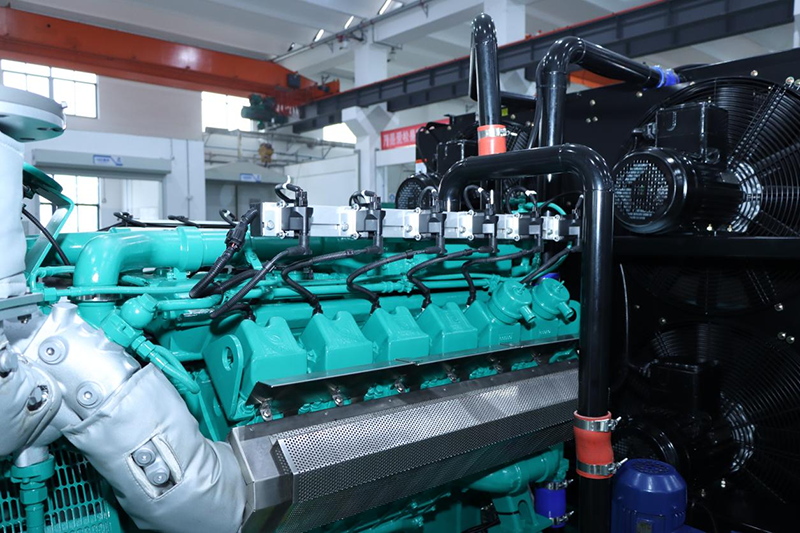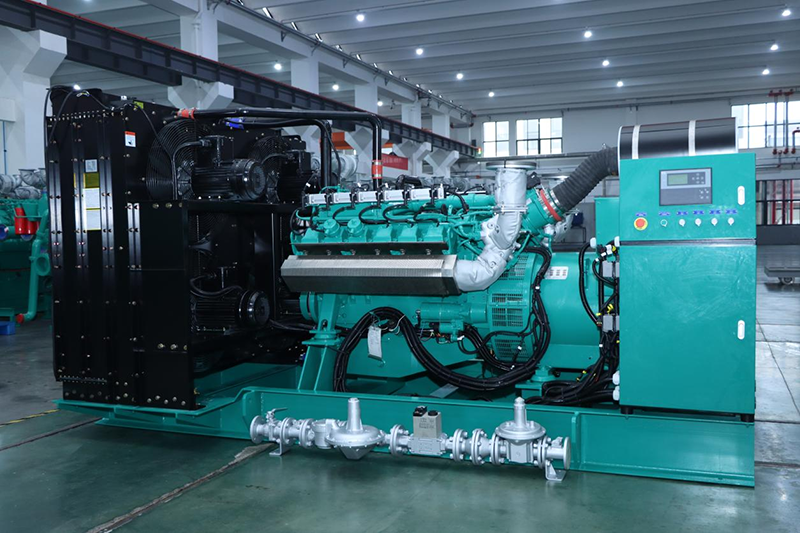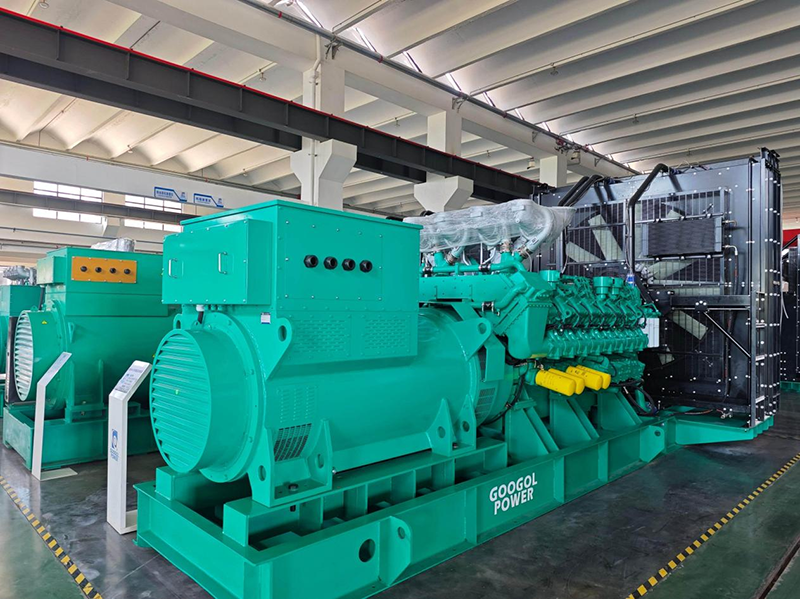Diesel Engine
Generator Set

A diesel generator set is a power supply device that utilizes a diesel engine as the prime mover to drive a synchronous generator for electricity generation.It is a power generation installation characterized by quick starting,convenient operation and maintenance,relatively low investment,and strong adaptability to environmental conditions.As generators find increasingly widespread application,various malfunctions are inevitably encountered during use and operation.Below is a brief explanation of 11 incorrect operation methods for diesel generators:

1.Applying Load Immediately After Cold Start Without Warming Up:During a cold start,the high viscosity and poor fluidity of the engine oil lead to insufficient oil supply from the oil pump.This results in inadequate lubrication on friction surfaces,causing rapid wear and potentially severe failures such as cylinder liner scoring/scuffing and bearing burnout(bearing seizure).Therefore,after a cold start,the diesel engine should idle to warm up.Load should only be applied once the oil temperature reaches above 40°C.For mobile units,start in a low gear and progressively move through each gear for a certain distance until oil temperature normalizes and oil supply is sufficient before normal operation.
2.Operating the Diesel Engine with Insufficient Oil:Insufficient oil supply leads to inadequate lubrication at friction interfaces,causing abnormal wear or scoring/seizure.Ensure sufficient oil levels before starting and during diesel engine operation to prevent failures like cylinder scoring or bearing burnout due to oil starvation.
3.Shutting Down Abruptly Under Load or Immediately After Removing Load:After shutdown,coolant circulation stops abruptly,drastically reducing heat dissipation capacity.Heated components lose cooling,potentially causing overheating,cracks in the cylinder head,cylinder liner,or engine block,or excessive piston expansion leading to seizure within the liner.Furthermore,shutting down without an idle cooldown period leaves friction surfaces with insufficient oil film,exacerbating wear upon the next start due to poor lubrication.Therefore,remove the load before shutdown and gradually reduce engine speed,allowing several minutes of no-load operation.

4.Revving the Throttle Aggressively After a Cold Start:Aggressive throttle input causes a rapid increase in engine speed.Some friction surfaces may experience dry friction,leading to severe wear.Additionally,the sudden force changes on the piston,connecting rod,and crankshaft cause intense impacts,easily damaging components.
5.Operating with Insufficient Coolant or Excessively High Coolant/Oil Temperatures:Insufficient coolant reduces cooling effectiveness,causing the diesel engine to overheat.Excessively high coolant or oil temperatures also lead to overheating.Key components like the cylinder head,cylinder liner,piston assembly,and valves endure significant thermal stress,causing a sharp decline in mechanical properties(strength,toughness).This increases component distortion,reduces clearances,accelerates wear,and can cause cracks or component seizure.High temperatures also accelerate oil aging,degradation,and consumption(burn-off),while reducing oil viscosity.This worsens lubrication conditions for critical friction pairs like the cylinder liner/piston,leading to abnormal wear.Overheating further deteriorates the combustion process,causing injector malfunction,poor atomization,and increased carbon deposits.

6.Operating with Excessively Low Coolant or Oil Temperatures:During operation,low coolant temperature lowers cylinder wall temperature.Combustion water vapor condenses and reacts with exhaust gases forming acidic compounds that adhere to cylinder walls,causing corrosive wear.Practice shows that operating consistently at 40-50°C coolant temperatures results in several times more component wear than at the normal operating temperature(85°C–95°C).Low temperatures extend the ignition delay period;once ignition occurs,pressure rises rapidly,causing harsh/diesel knock(combustion roughness),which can mechanically damage parts.Long-term operation at low coolant temperatures increases piston-to-liner clearance,promoting piston slap(knocking)and vibration,leading to cylinder liner cavitation corrosion.Low oil temperature increases viscosity and reduces fluidity,leading to insufficient oil supply at lubrication points and poorer lubrication.This increases friction pair wear and shortens engine life.
7.Operating with Low Oil Pressure:Low oil pressure prevents normal oil circulation and pressure lubrication within the system,depriving lubrication points of adequate oil.Therefore,during operation,monitor the oil pressure gauge or warning light closely.If oil pressure falls below the specified minimum,shut down the engine immediately and resolve the issue before resuming operation.
8.Overspeeding and Overloading the Unit:Severe overspeeding or overloading forces the diesel engine to operate under excessive load and high RPM.This promotes harsh combustion,increases thermal and mechanical stress on the cylinder liner,piston,and connecting rod,and can cause failures like cylinder scoring and bearing burnout.Chronic overloading subjects the engine to prolonged harsh combustion,easily damaging the cylinder head gasket.

9.Revving the Throttle Aggressively Before Shutdown(Flooding):Suddenly stopping a high-speed diesel engine subjects crankshaft,connecting rod,and valve train components to damaging inertial forces,shortening their service life.Aggressive pre-shutdown throttle input also causes excess unburned fuel to wash down cylinder walls,diluting the lubricating oil.Furthermore,it significantly increases carbon deposits on the piston,valves,and combustion chamber,potentially leading to injector nozzle clogging and piston seizure.
10.Adding Coolant Abruptly When the Diesel Engine is Overheated:Adding coolant suddenly to an overheated,water-deficient engine can cause the cylinder head,liner,or block to crack due to extreme thermal shock.Therefore,when the engine overheats,first remove the load,slightly increase RPM to aid cooling.Once the water temperature drops,shut down the engine.Then,carefully loosen the radiator cap to release steam pressure.If necessary,slowly add coolant to the radiator.
11.Prolonged Idling Operation:During extended idling,oil pressure is low,and piston crown spray cooling is ineffective,leading to sharply increased wear and susceptibility to cylinder scoring.It also causes poor atomization,incomplete combustion,severe carbon buildup,and can sometimes result in stuck valves/piston rings or cylinder liner cavitation corrosion.Consequently,some diesel engine operation manuals explicitly state that idling should not exceed 15-20 minutes.